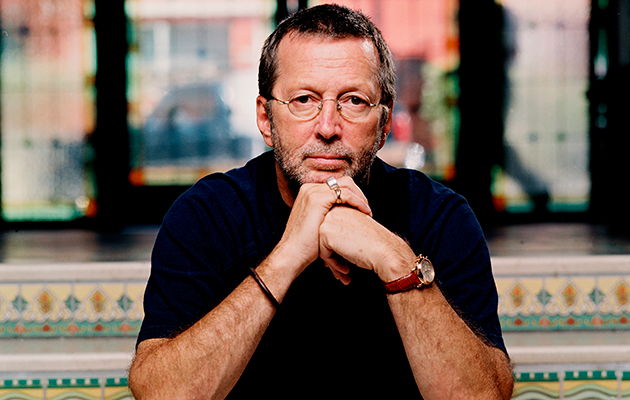All this talk of peers and staunch principles inevitably steers the conversation in the direction of JJ Cale. Though the two were only friends for the final 10 of Cale’s 74 years, the Oklahoma guitarist, singer and songwriter had a profound influence on Clapton for more than four decades.
The Tulsa Sound, Cale’s uniquely minimalist and deceptively simple blend of mid-paced shuffles, spare melodies and low, laconic vocals, entranced Clapton when he first heard it in 1969. He finds it no less seductive today. “It’s a constant challenge to me with JJ,” he says, “every time I hear anything, a single or an album or anything, just to try to analyse how he did it.”
Having recorded his first Cale cover, “After Midnight”, in 1970, Clapton has returned to the source regularly ever since, most famously on his hit version of “Cocaine”. With little commercial success of his own, it was these high-profile Clapton covers (as well as others by the likes of Johnny Cash, Waylon Jennings, Captain Beefheart, Lynyrd Skynyrd, Santana and Poco) which enabled Cale to earn a comfortable living, a deal which Clapton reckons suited the reticent musician just fine. “I don’t think he had any interest in fame at all,” he says. “He liked the perks as much as anybody, but it was all, really, about making great music.”
The pair finally worked together on 2006’s Grammy-winning collaboration The Road To Escondido. Clapton reminisces fondly about their relationship, recalling with a chuckle how he convinced his notoriously publicity-shy friend to spend three days on the promotional hamster wheel in a hotel room in New York. “We’d just wind each other up,” he says. “In the end I wanted to get out of there as much as he did!” Of all Cale’s many admirers – a long list which includes Neil Young, Mark Knopfler, Tom Petty and Beck – Clapton has been by far the most trenchant. Conceived immediately following Cale’s death from a heart attack on July 26, 2013, The Breeze is the culmination of Clapton’s long-term commitment to bring his friend’s work to widespread attention. “I made it clear to him that I wanted to spread the message,” he says. “I think the deal was that as long as he didn’t have to get too much involved then it was fine.”
When did you first become aware of Cale?
I was touring with Blind Faith in 1969 when I met Delaney and Bonnie. Delaney was very keen to introduce me to stuff he liked. Through him I met The Crickets, people like that, a whole community of people in the valley in LA. He said, “You should hear this,” and he gave me the [1966] single of “After Midnight”, which had “Slow Motion” on the A-side. I thought it was fantastic, and we tried to work it out. It was really elaborate, it seemed. I’ve listened to it again and again and again and I’m still pretty sure I haven’t worked it out. Are there four guitars on there? Or three, or two, or five? Interlocking, all playing different stuff. It’s like a Chinese puzzle. As much as anything, back then there was something about the reverence other musicians showed towards JJ. He was a great musician, songwriter, singer, but he was like a lone wolf. There was something about him that made me very curious, a real mystique. So my radar went up.
You very quickly recorded “After Midnight”, and you’ve returned to his music throughout your career. Is there an evangelical aspect to that, saying to your audience, ‘Look, this guy is incredible and you should check him out’?
Well, I’ve always had that. I don’t know why. I think I have an impulse to share, especially with music. Music from my earliest recollection has had such a profound effect on me, and if there were more people than me listening I’d look around to see if it was having the same effect. I was always thinking, ‘This is hitting me hard, I want to share this and see if other people feel the same way.’ So when I got to JJ, I thought, ‘There’s got to be a lot of people who hadn’t heard it yet, so maybe I could give it a nudge in the right direction.’ He knew that.


